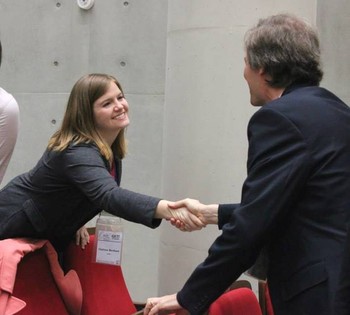More than 200 international theology students of varied Christian traditions have commenced participating in the Global Ecumenical Theological Institute (GETI).
An opening gathering with a vibrant worship service at the Graduate School of Theology of Hanshin University marked the beginning of the GETI on Oct. 26 in Seoul, Republic of Korea.
The participants will continue the GETI program for another two weeks alongside the World Council of Churches (WCC) 10th Assembly in the southeastern city of Busan.
The WCC assembly began Wednesday (Oct. 30), addressing the theme “God of life, lead us to justice and peace.”
A joint initiative of the WCC’s ecumenical theological education program and the Korean Host Committee for the WCC assembly, the GETI program focuses on the “future of ecumenism and transformation of world Christianity in the 21st century.”
The GETI brings together a faculty of 25 theology professors from around the world, as well as ecumenical scholars lecturing on the WCC assembly theme.
At opening worship for the GETI, its theology students were welcomed by Chae Soo Il, president of the Hanshin University. He expressed “great hope” in the potential of the GETI participants to become future leaders of the ecumenical movement.
“Revitalization of the ecumenical movement depends on leadership formation of the younger generation of theologians,” said the Rev. Dietrich Werner, the WCC's program coordinator for ecumenical theological education.
Werner added that “young theologians are at the center of conceptualizing new contours of global ecumenism responding to rapidly changing patterns of global Christianity and Christian identity concepts, especially in relation to ecological challenges and interfaith realities.”
The GETI also received a positive response from several Korean churches, including the Yoido Full Gospel Church in Seoul. Theology students participating in the GETI have underlined the “unique and historic character of the program, contributing to ecumenical transformation and learning process.” They believe the GETI has “far-reaching impact for future networking in ecumenical partnerships and theological education.”
A GETI communication team will produce a documentary on experiences of the GETI participants, which will be made available for the general public in the due course of time.
Video recordings of lectures for the GETI are featured on the website of the global theological library: GlobeTheoLib. Other updates on GETI may also be found on the GETI Facebook page and Twitter @geti2013.

